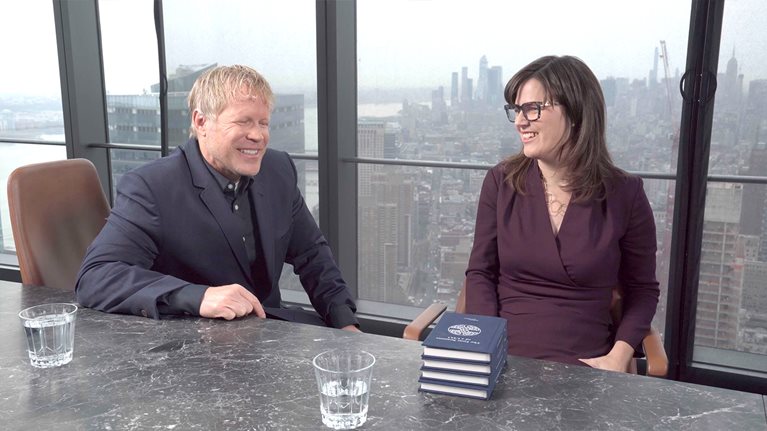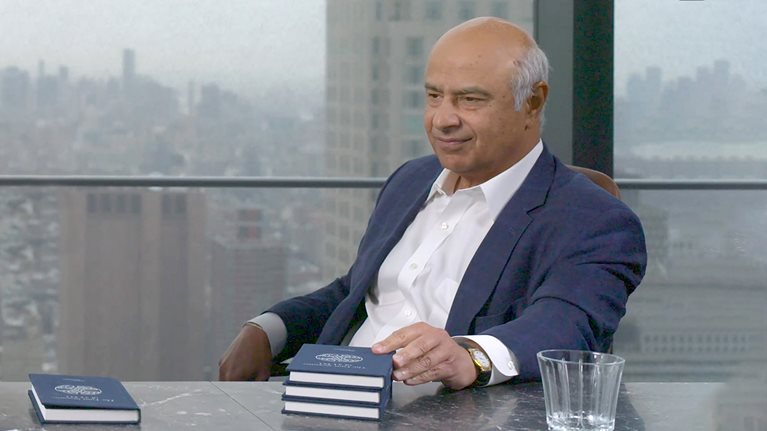In this second installment of “CEO Excellence revisited,” McKinsey senior partners Carolyn Dewar, Scott Keller, and Vik Malhotra speak with McKinsey Global Publishing leader Raju Narisetti about how leadership lessons from their book, CEO Excellence: The Six Mindsets That Distinguish the Best Leaders from the Rest (Scribner/Simon & Schuster, March 2022), have resonated beyond CEOs to aspiring leaders. An edited version of the second installment of this three-part conversation follows. See the first part of the discussion here, and the third part here.
Raju Narisetti: How does it feel to be authors of this bestseller?
Scott Keller: I feel frustrated with all the paparazzi, signatures, autographs, and lack of privacy and security. No, interestingly, from a practical standpoint, I would say it fits with the Zen Buddhist quote, “Before enlightenment, chop wood, carry water. After enlightenment, chop wood, carry water.”
The day-to-day is very similar to what it was before. From a spiritual standpoint or from public sentiment, there are some magic moments that happen. For example, we were watching the Netflix series Drive to Survive, and they were panning into the CEO of McLaren’s office, and there’s CEO Excellence on his desk.
During little moments like that, you say, “Wow, that’s pretty cool.” We were on holiday in Cambodia, and my special-needs son said, “There’s Dad’s book.” There was a bookstore in the airport. We all thought he was just kidding, because he says things like that if there’s a bookstore. Of course Dad’s book is in there.
Then one of my other sons said, “Look, there it is.” So we started taking pictures. Those are magic moments. That has been fun. It’s exciting to see that it has become so popular with people, because, clearly, they’re getting things out of it. That’s why we wrote it: to help people. It’s just a great feeling to know that it’s helping people at scale.

Carolyn Dewar: I can’t believe it has been two years. Much like Scott said, we never set out to do this for its own sake—to be authors.
I’m excited by the reach it has had, because people are finding it useful. That was always my hope—that we would write something and put it out into the world, and that it would be practical and helpful for people. That’s what is resonating, well beyond CEOs.
For almost any leader in the world, 90 percent of what’s in the book resonates and is helpful. The world needs great leaders right now. So the idea that the voices, as Scott mentioned, of all these other CEOs are contributing to that is really exciting and a real privilege.
That was always my hope—that we would write something and put it out into the world, and that it would be practical and helpful for people. That’s what is resonating, well beyond CEOs.
Vik Malhotra: Well, it feels great. I appreciate Scott saying the world didn’t change that much as the author of seven books. But when you’re the author of your first book, it does feel great.
In many ways, I view the last two years as life-changing, even career-changing. I’ve been doing what we do for 38 years, and I didn’t really think I’d get this gift in terms of what happened.
I thought we’d write this book, and hopefully, people would learn something from it. I agree that the stories are the most powerful. I always thought just the stories of CEOs who’ve done unusual and impactful things would be powerful. I thought, “We’ll find a way to get those messages out.”
But the minute the book made the bestsellers list, it changed the equation. Beyond sharing this internally with some of our colleagues and their clients, I initially thought this would be a book that would sit on my shelf. One day, when I became a grandfather, which I’m not yet, I’d be able to point to it and say, “Hey, I coauthored that book.”
The stories are the most powerful—the stories of CEOs who’ve done unusual and impactful things. I thought, ‘We’ll find a way to get those messages out.’
Instead, it turned out to be just a remarkable two-year journey. Initially, there were three or four months of just external appearances, in which I had very little prior experience. So it was energizing and fun to be able to do podcasts, appearances on TV shows, and that kind of thing.
To me, the most exciting piece of this is the part that I really view as career-changing in many ways. I think once our colleagues realized that we had a bestseller on our hands, they could easily say to their clients, “We’ve got a bestseller here. Would you like to hear from one of the authors?” So all three of us have had remarkable pulls on our time, in terms of showing up for conversations with aspiring CEOs, new CEOs, even tenured CEOs. And that has been hugely energizing.

Raju Narisetti: You’ve written and coauthored seven books. How was it different this time around?
Scott Keller: It’s exciting. If you were in a band, and you had a hit album, you would get to tour the world with your hit album. Here, it feels different, because you know you’re making a difference in a way that’s bigger and more exciting.
For me, given my foray into leadership books and writing, it was grounded in the notion that the role of a leader is to put conditions in place for others to be successful, not for the leader to try to be successful. And, paradoxically, it becomes the same thing.
What’s exciting for me about this book is the way the voice of these CEOs, who are excellent CEOs, crescendoes into that same message. It means people want to hear Jamie Dimon talk about it or Satya Nadella talk about it.
They care a little bit less about what Scott Keller says, to be honest. To have that kind of amplification of such a profound leadership message is really special with this one.
I’ve written seven books, and only one was a New York Times bestseller, so full credit to my coauthors, because, clearly, that’s the difference maker here.
My foray into leadership books and writing was grounded in the notion that the role of a leader is to put conditions in place for others to be successful, not for the leader to try to be successful.
Raju Narisetti: All of you have kids of varying ages. What has been the reaction from your family?
Vik Malhotra: My kids are now 25, 29, and 32. The initial reaction from them was, “Oh, a McKinsey book. Some McKinsey guy must have written it. You just put your name on it.” They just cast it aside.
Later, my now-32-year-old daughter read the book. She took the time and energy to go through it all and said, “Wow. I learned a lot. Dad, for what it’s worth, the first two-thirds of the book are spectacular. It’s the best learning experience I’ve had around leadership ever.”
So, she’s taken real pride in saying, “I’m the only kid who’s actually read this book.” She brings up incidents or vignettes in the book and speaks at family gatherings about them. Her brothers give her a hard time.
It has been a journey for all three of them. My kids have gone from being a little skeptical to being quite proud of the fact that the book has made so many bestseller lists, even though they don’t always verbalize that.
Every now and then my son, who’s a venture capitalist, actually persuades me to talk to some of the companies that he’s investing in so that they can learn from this. But he hasn’t quite taken the time to do the reading himself yet.
Raju Narisetti: It probably also made for an early, good Christmas gift, right? Sign it and give it to them.
Carolyn Dewar: Certainly, the Netflix reference was the cool factor with the kids. They loved seeing it when they were watching the Formula 1: Drive to Survive show. I’m laughing because my eight-year-old daughter, who’s our youngest, may have read it more than anyone in my family.
She has tried to get through it. I keep catching her, and she’s hilarious. She will rule the world one day. She’s both amazing and terrifying at the same time. For my birthday, she wrote me a sweet card that said, “Mommy, I think you have all the qualities to be even better than a CEO.” Then she signed her name. I don’t know if that’s a compliment or not, but it’s seeping in somehow.
Raju Narisetti: That’s an endorsement worth putting in the back of the book.
Carolyn Dewar: It was pretty funny. I will keep it forever.
Scott Keller: Since my kids are teenagers or just beyond teenage years, it’s really interesting when their friends say something about the book. My son who just graduated from Yale has a couple of friends with parents who are CEOs. They noticed the last name on the book on their parents’ desk, asked my son, and made that connection.
You could tell he thought, “Oh, that’s pretty cool. Actually, someone reads that book. My friend’s dad said that’s a great book. Wow, that’s neat.” So, that’s when I get credit for it. I’ve written a lot of books now. So my family knows when I’m in the study, working on a book.
During the time I worked on the book, every night at dinner my special needs son would say, “Have you finished your book? Have you finished your book?” He would be incessant about it.
At some point the book was finished, and we’d sit down for dinner. Then, every night, he would say, ”You finished your book,” and he’d be super excited about it. That has become a code word in my family. Anytime anything good happens to people, we say, “You finished your book.”
So it’s always a celebratory thing. The book is alive and well in the Keller family in terms of mindset.
Vik Malhotra: They do get a big kick out of foreign-language editions.
Scott Keller: I was in a documentary called Rock Camp: The Movie. As a result, I have an entry in IMDb [Internet Movie Database]. According to my kids’ friends, that is way cooler than being a New York Times bestseller. They say, “Whoa, he’s in!” Since a lot of famous people’s names are in IMDb, and they can look my name up online, it’s a big deal. Unfortunately, for that generation, the New York Times and the Wall Street Journal don’t quite cut it for cool dad.


